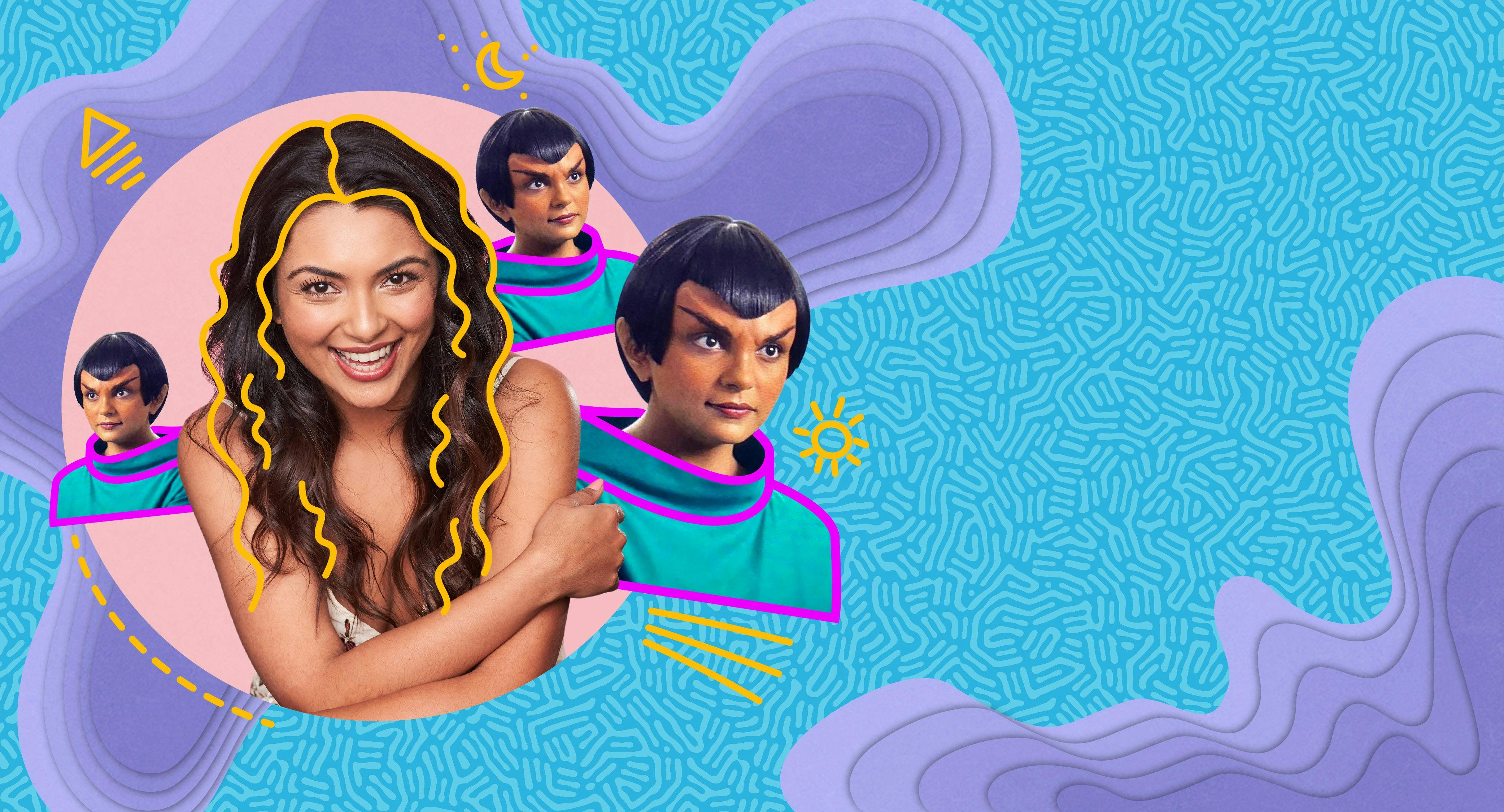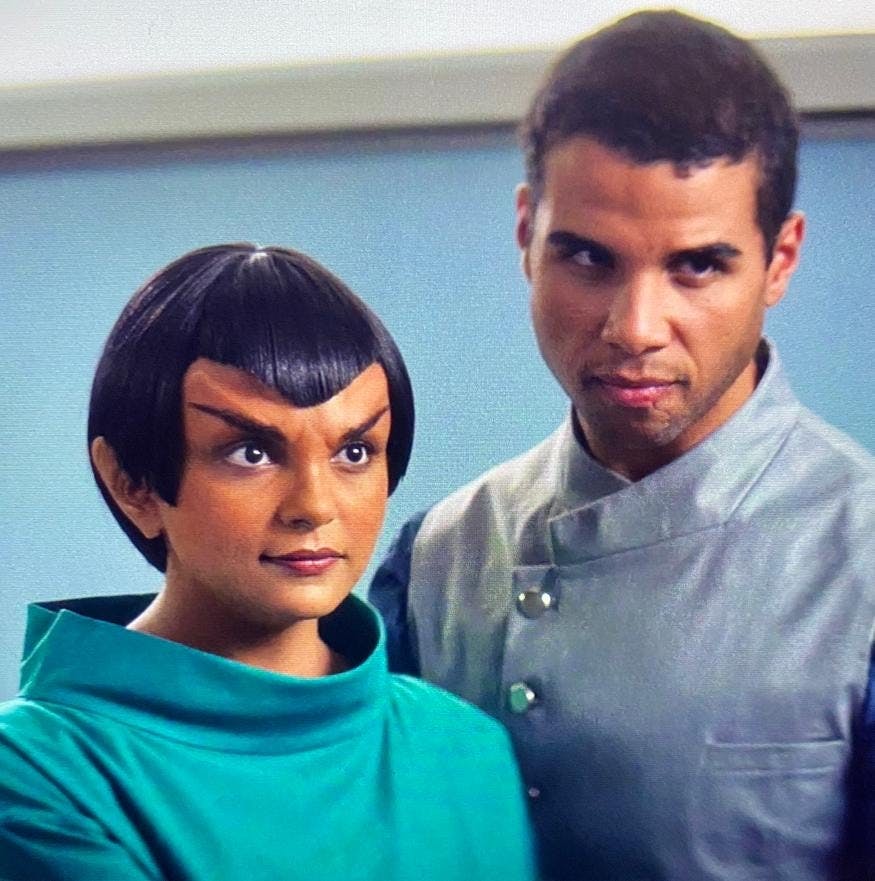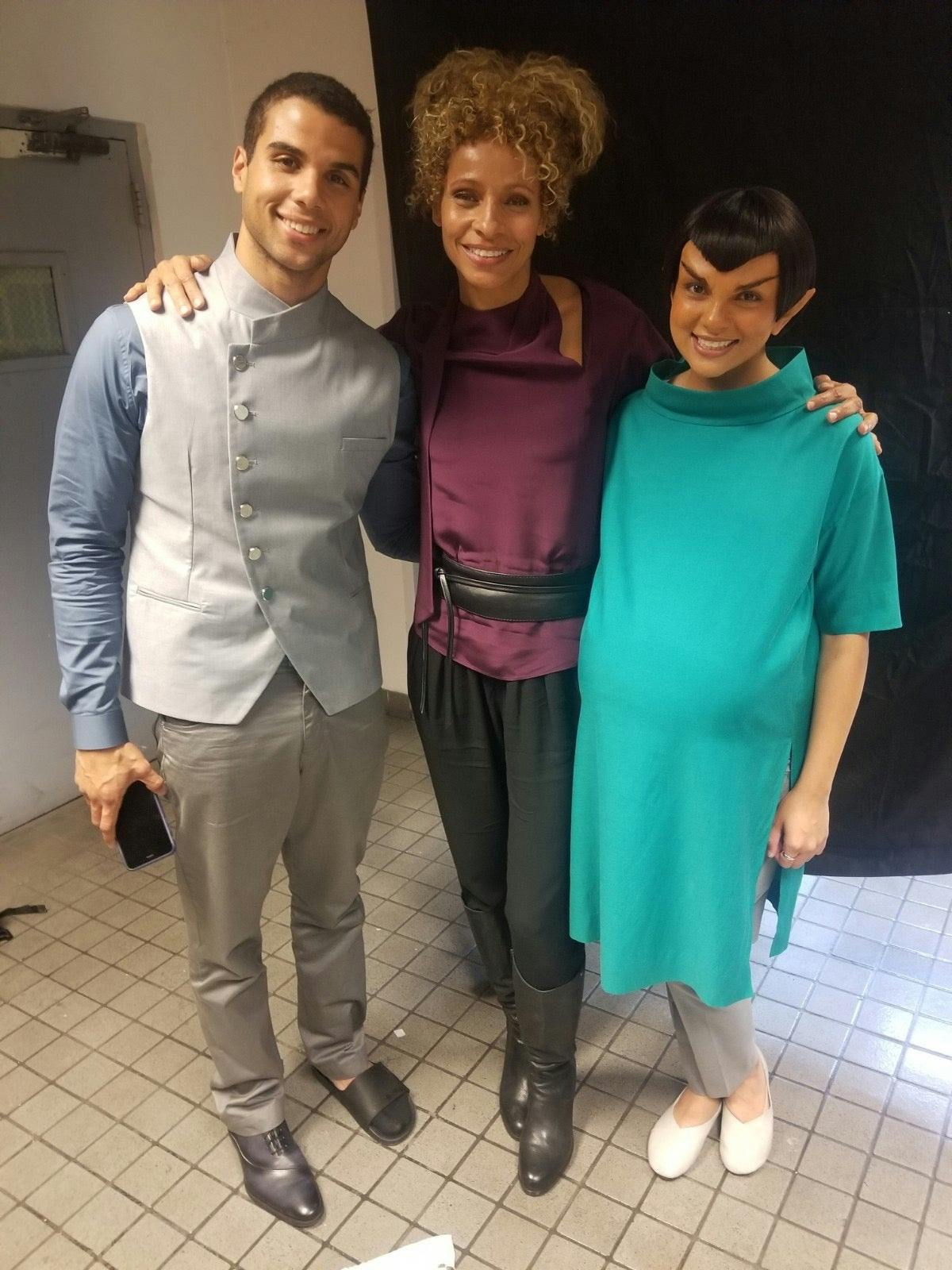Published Jan 21, 2021
Ayushi Chhabra Says Star Trek is Writing Narratives for Our Time
The Picard actress on playing Pel, uniting two worlds and learning to autograph really, really quickly.

StarTrek.com
We were introduced to Pel in “Stardust City Rag,” the fifth episode of Star Trek: Picard’s debut season . In the previous episode, the crew took a detour to the planet Vashti, where they met up with Romulan refugees. Their continued search for Bruce Maddox takes them to Freecloud, where an awkward scene plays out between Pel, her husband Gabriel “Gabe” Hwang, and his mother, Raffi Musiker (played by Mason Gooding and Michelle Hurd respectively).
Back in 2020, it’s 8.30am in LA, and Ayushi Chhabra is already her usual human self. Equal parts contemplative and effusive, the Indian actress, who grew up in Nigeria and South Africa, is eager to talk about her Star Trek role and how Picard’s first season spoke to the ongoing fight against racial injustice in the United States.
Episode Preview | Star Trek: Picard - Stardust City Rag
How has this year been for you as an actress from the global south, and what was it like being in the US during this turbulent time?
Ayushi Chhabra: Honestly, I would say I’ve experienced more racism in South Africa, more in India even. But we’re living in this amazing time in the US, as this country fights for democracy. Thanks to the Black Lives Matter movement, there’s way more opportunity for people of color in our industry. We see so much white representation on US television and not enough people of color. Now I’m noticing more breakdowns asking for Indigenous and [Black] actors; there’s this sense the industry’s taking a stance. That's progress.

StarTrek.com
Science fiction is fertile ground for exploring issues which aren’t necessarily easy to tackle in other genres.
AC: The entertainment industry is a reflection of whatever’s happening in society. And they’ve adapted quickly. And then to act in Star Trek and to see these parallels in a television show, it's almost as if they predict what’s going to happen.
How does being on the Star Trek set differ from your previous experiences on other sets?
AC: It was life changing to be around people who’ve done incredible things in the industry, a once in a lifetime opportunity. When I auditioned for the role I had no idea I was even auditioning for Star Trek; or that I was going to be an alien! The next day I'm crossing the road in Hollywood, and my agent calls to say I booked Star Trek. She was telling me to research all these things and then she said: ‘I want you to go home and watch Nemesis right now.’
When [she] told me I’d be playing a Romulan, I asked, “what is that?” She just checked if I’m comfortable wearing prosthetics [laughing].
Speaking of prosthetics, tell us about your metamorphosis into Pel.
AC: The prosthetics team had all these masks they’ve made over the years. So many wigs and ears and foreheads. A whole different world! We tried on prosthetics to see who they could transform me into, and the team was sending pictures to the executive producers and going back and forth. At one point they were covering my brows and my hair, putting a small wig on and then another wig, and then a really big forehead.

StarTrek.com
Creating her sounds like it was a collaborative experience, which is something David Ajala, who plays Cleveland “Book” Booker in Discovery has spoken about as well.
AC: Absolutely. I mean, hair and makeup took four hours. When I saw my reflection afterwards I could only recognize my eyes. The essence of who I am was there, yes, but it wasn’t me: I was totally transformed! The team have been doing this for so long, they’re such professionals. I mean, I had this huge belly...
A really huge belly!
AC: ...I was probably carrying multiple aliens [laughs]. I sat in my trailer under all that hair, makeup and prosthetics, for 10 or 12 hours in the LA heat before they called me on set. But honestly, you forget about it the minute you’re there.
I’m like, ‘I'm being directed by Jonathan Frakes, as in the most legendary Star Trek actor, on a production being executive produced by Sir Patrick Stewart’ … None of the discomfort matters because once you're on set you’re finally living your dream. My biggest goal was to soak it all in and make the best of every single moment because I don't know when it will come again.
Bumping into Raffi Musiker, Gabe’s mother, from whom he is estranged, is really connecting Hwang’s joyful present to his traumatic past. Tell us about filming the scene between yourself and Gabe and Raffi?
AC: For Pel, seeing Raffi was coming face to face with the person who caused her husband terrible pain, and it changed the mood from being joyful about the baby to this confrontation with Gabe’s past. Raffi has a substance abuse problem, she left Gabe as a child. She cared more about work than for him. Before the first take, Jonathan Frakes did a rehearsal with me, Mason [Gooding] and Michelle [Hurd]. I was so starstruck.
Was there anything that surprised you about the way he directed this scene?
AC: Jonathan is so warm. He’s an actor so he’s also very much an actor's director. He likes to ask, ‘Oh, what do you feel, how do you think we should do this? You know, do you want to come in from here? Should we move the couch?’ He’s just very cool about all of it.
One thing I learned while on set is something Jonathan taught me, which is while the lines are important, it’s the things we do with them which truly matter. It’s not so much the words as it is the emotion between the words; the subtext, what's going on on the inside, how you can say this or that with your eyes. For him, the goal is to convey the emotions in the most authentic, real, touching way. He came to me during one of the takes, and said, ‘You know the thing you do when you see her [Raffi] and go from smiling to not smiling? I really like that moment. I would love for you to keep that.’
And I was like, whatever you want Jonathan Frakes [laughs]! He wanted everything to be conveyed by this one emotion. He told me, “That’s the scene.”
At one point he asked if I wanted to be in the scene. Obviously I did. He told me to make sure then that Mason doesn’t cover me, to not go behind him. He said, ‘I want you to be very aware of where the camera is, we cast you because we want you in this scene.’
For anyone who's grown up wanting to be an actor the whole goal is to transform physically and mentally. What was so great is I could physically transform so it really helped me get out of myself and be the other person. Generally, when you don't have all the armor it's much harder to sink into a character. It was literally living an actor's dream, which is to completely be that person.
For those 12 hours I wasn't me, I was Pel.

StarTrek.com
Are there plans to feature Pel again?
AC: I don’t know, I hope they bring her back when they start casting for next [season]. I would love to play Pel and be on set with this amazing team againI remember when I was wrapping with the prosthetics team, they said, ‘Well you never know, you may come back.’ And I said really? They told me to keep the hope alive, because “It’s Star Trek and they always bring people back.” Bringing her back would be so exciting, I’d love to see Pel and Gabriel’s daughter!
Star Trek is 54 years old. How has acting in such an iconic production impacted or shaped your career?
AC: I get bigger auditions, for series regulars and not just co-stars. You’re taken more seriously when you’ve been on a big set, there's more trust in your work. You could be an amazing actor all along but if you don’t have those credits under your belt then productions are like, well, we have a million dollars riding on this one scene and we need to know you can handle those pressures.
Did playing Pel engage you on a personal level at all, and can we call this your big break?
AC: It’s definitely my foot in the door. Hopefully from this will come the big break. Before me there have only been two other Indian women to play Romulans ever in Star Trek history. Being a person of color playing a Romulan has impacted the Star Trek community, and they've just opened their arms to me. Someone sent me 500 postcards to sign recently and it was the most wonderful experience as an actress! I didn't even know how to autograph [laughs]. All you ever do as an actress is work, work, work and you never think about what it would be like to do things like, well, autograph!
It’s common knowledge that the Star Trek community are especially protective over characters and the actors who play them. What surprised you most about your experience?
AC: The community is universally collaborative, on and off set. A Star Trek fan in South Africa can connect with a fan in the United States — there’s this massive camaraderie on so many levels. Globally fans contact me through Instagram and Facebook and I'm so happy the community has welcomed me into it. Since playing Pel I've definitely immersed myself more in the universe and met so many people, especially Star Trek followers.
My biggest takeaway from this whole thing is when people are united we can truly make change happen. Whether you’re Romulan or human, whether you're Black or white, it really takes all of humanity to unite to bring about any form of big change.
Megan Ross (she/her) is a South African writer and author of Milk Fever (uHlanga Press). Her work has appeared in Catapult, New Frame News, The Good Trade and Glamour (SA), and she is a winner of both the Brittle Paper Award for Fiction as well as an Iceland Writers Retreat Alumni Award. Find her on Twitter @itsmeganross
Star Trek: Picard streams on Paramount+ in the United States, in Canada on Bell Media’s CTV Sci-Fi Channel and streams on Crave, and on Amazon Prime Video in more than 200 countries and territories.
